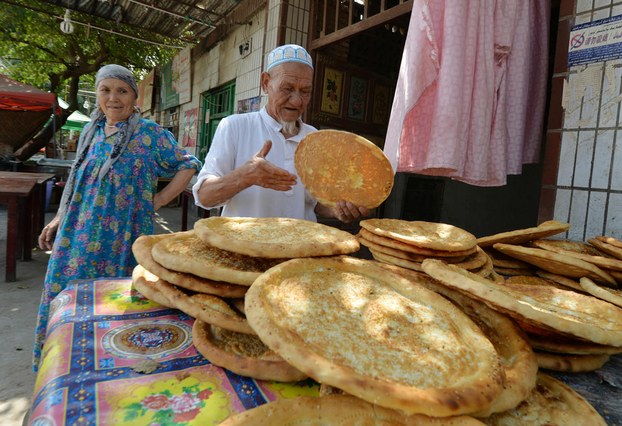China: HIV/AIDS awareness takes second place to 'stability maintenance' in Xinjiang
| Publisher | Radio Free Asia |
| Publication Date | 19 August 2016 |
| Cite as | Radio Free Asia, China: HIV/AIDS awareness takes second place to 'stability maintenance' in Xinjiang, 19 August 2016, available at: https://www.refworld.org/docid/57d8fd717.html [accessed 21 May 2023] |
| Disclaimer | This is not a UNHCR publication. UNHCR is not responsible for, nor does it necessarily endorse, its content. Any views expressed are solely those of the author or publisher and do not necessarily reflect those of UNHCR, the United Nations or its Member States. |
2016-08-19
 Uyghurs display bread at their stall in Lukqun, Xinjiang Uyghur Autonomous Region, June 27, 2013. AFP
Uyghurs display bread at their stall in Lukqun, Xinjiang Uyghur Autonomous Region, June 27, 2013. AFP
Authorities in northwestern China's Xinjiang region are allowing HIV infection rates to spiral out of control by favoring "stability maintenance" education over efforts to promote a better understanding of the disease and its causes, sources say.
As of October 2015, about 38,238 people were living with HIV/AIDS in Xinjiang, according to figures released by the Xinjiang Uyghur Autonomous Regional Health and Family Planning Committee.
Now, with 2,591 people in Xinjiang found to be newly infected during the first six months of this year, the HIV virus has swept "like a flood" across the region's mostly Muslim southern areas, a clinic owner in Kashgar (in Chinese, Kashi) prefecture's Peyziwat (Jiashi) county told RFA's Uyghur Service.
Local authorities have meanwhile failed to control the disease's spread, RFA's source said, speaking on condition of anonymity.
"They believe that 'religious extremism' is a more dangerous threat than HIV/AIDS, and have ignored the educational work that could prevent infections," the source said.
The early spread of AIDS in Xinjiang was linked to drug use and occurred mainly in the north, but sexual transmission in migrant brothels now drives the climb in rates of infection among farmers and other young Uyghurs in Xinjiang's south, the source said.
HIV-infected prostitutes working in massage parlors, barber shops, public baths, and "hotels" are actively spreading the disease, "but nobody cares about this," he said.
"The owners [of these facilities] all come from China's central and eastern provinces and cities," he said. "They are all Han Chinese."
"I can't say much about this, though. You understand what I mean."
Programs stopped
Sexual transmission now accounts for more than 85 percent of all new infections across the Uyghur region, a former senior official at the Office for HIV/AIDS Control and Prevention in the regional capital Urumqi told RFA.
And though officials hoping to fight the spread of the disease had formerly held large-scale educational programs each year focused on prevention, "since 2014, these have all been stopped," he said.
"Local governments no longer want us to come because of the pressures of '[political] stability work," he said, adding, "They say that gathering large numbers of people in any one place is a threat to social stability."
China has vowed to crack down on what it calls religious extremism in Xinjiang, and regularly conducts "strike hard" campaigns including police raids on Uyghur households, restrictions on Islamic practices, and curbs on the culture and language of the Uyghur people, including videos and other material.
But experts outside China say that Beijing has exaggerated the threat from Uyghur separatists, and that domestic policies are responsible for instability in the region and an upsurge in violence that has left hundreds dead since 2012.
Reported and translated by Eset Sulaiman for RFA's Uyghur Service. Written in English by Richard Finney.
Link to original story on RFA website
